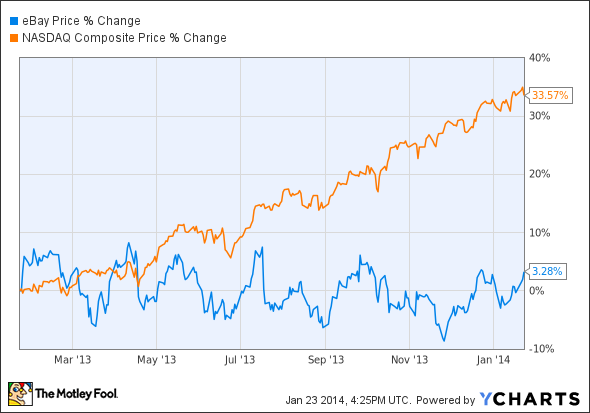Judging by the look of it, tech investors these days find online-auction pioneer eBay (EBAY +0.65%) about as exciting as watching paint dry.
As the tech-heavy Nasdaq has continued its upward march over the last 12 months, eBay's shares have languished, returning a feeble 3% return to the Nasdaq's 33% jump.
When eBay reported its Q4 '13 earnings this week it was once again a mixed bags in terms of meeting analysts' expectations.
Earnings aside though, the real firework that has heads once again turning toward eBay was the announcement that activist investors and corporate antagonist extraordinaire Carl Icahn has set his sights on eBay as the target of his next major corporate showdown.
Icahn, per usual, has his own ideas about what eBay could be doing to maximize "long-term shareholder value." And while his ideas about value creation at eBay might appear controversial to some, they're certainly worth at least considering given eBay's recent share price struggles.
eBay auctioning PayPal?
In true activist fashion, Icahn is lobbying that eBay should spin off its PayPal payment-processing subsidiary.
Since being acquired by eBay in 2002, PayPal has in many ways grown into the crown jewel among eBay's various businesses. From 2002 through 2012, PayPal grew its revenue at a mindboggling high 50.2% annual average rate. Granted, PayPal's recent growth rates have moderated in recent years as its revenue now sits in the billions of dollars. For example, in eBay's most recently reported quarter, PayPal still managed 20% year-over-year growth, certainly better than the 11% from eBay's core auction business.
These numbers haven't escaped Icahn, either.
Running the numbers
Without diving too deep into its figures, let's check to see if he might be on to something by comparing how the market is currently valuing other similar business to PayPal.
|
Company Name |
EV / Revenue |
EV / EBITDA |
Pre-tax Operating Margin |
LTM Revenue Growth |
|---|---|---|---|---|
|
eBay |
4.1x |
13.7x |
24% |
14% |
|
Global Payments |
2.2x |
10.7x |
15% |
6.6% |
|
Digital River |
0.8x |
15.1x |
-43.2% |
4.7% |
|
Total Systems Services |
3.6x |
15.2x |
19.1% |
7.9% |
|
Visa |
12.2x |
19.3x |
61.5% |
13% |
|
Mastercard |
11.6x |
19.9x |
53.3% |
12.3% |
|
Average of comps |
6.1x |
16.0x |
21.2% |
8.9% |
Source: Cap IQ; all income metrics are quoted over the last 12 months
It's funny, but in looking at this, there's a fair case to be made that eBay as a whole (auctions and payments) is reasonably undervalued here, but we won't get into that here.
But before we get started I want to make it clear that this kind of comps analysis is by no means perfect. This is about as "back of the envelope" as it gets. A real comps analysis would be much more thorough, but hopefully this will at least suffice to give us a general sense of what could be if PayPal were to trade independently from eBay.
Looking at the comps, PayPal shouldn't command multiples at the higher end of the range with Visa or MasterCard because of their insane profitability, but it's also appreciable better than the top three payment-related companies. So we'll stick with the average multiples at the bottom.
And when we compare how PayPal might be valued if it were given its own independent valuation, it becomes clear pretty quickly that it indeed could unlock at least some incremental value for current eBay shareholders.
|
|
PayPal Enterprise Value |
eBay Enterprise Value |
Combined Enterprise Values |
|---|---|---|---|
|
Current Valuations |
27.1 |
38.5 |
65.6 |
|
Independent Valuations |
40.26 |
38.5 |
78.8 |
|
% Change In EV |
49% |
20% |
Source: Cap IQ, eBay Investor relations, author's calculations
So again, this example involves a lot in the way of assumption. But by applying the new trading enterprise value/total revenue multiple we selected from the chart above to PayPal in the independent valuations section, you see a meaningful increase in the aggregate business values.
The point key point to hold onto is that by no longer having eBay's and PayPal's values intertwined their combined valuations would probably be higher than they are today.
So, if that is in fact the case, why wouldn't eBay just embrace Icahn's plans?
That dirty little S-word
While eBay and PayPal might be worth more in terms of valuation apart than together, there certainly are reasons that they deserve to remain together as well.
It's easy to overlook but important to note that PayPal and eBay generate

Source: Twitter
massive synergies for each other. For example, eBay actually generates 30% of PayPal new users with no customer acquisition costs for PayPal. Moreover, half of PayPal's profits come from eBay users.
It's certainly true that eBay and PayPal could theoretically maintain their symbiotic business relationship while still independently trading. But the potential to add additional possible friction between these two business' seamless integration could result in real problems for either company in the future. Is that really a risk worth taking?
While eBay's board appears to be firmly committed to keeping both eBay and PayPal under the same corporate umbrella, Icahn has returned fire saying he's ready to take the matter to a proxy fight if needed, but it's certainly possible he's just posturing. Either way, we're probably getting ahead of ourselves altogether, but this is certainly an interesting thought exercise about what could be.
As we saw above, there's little doubt that divesting PayPal would probably result in a quick buck for eBay shareholders today. But considering the possible negative business implications, it seems at least today that the juice just isn't worth the squeeze.










